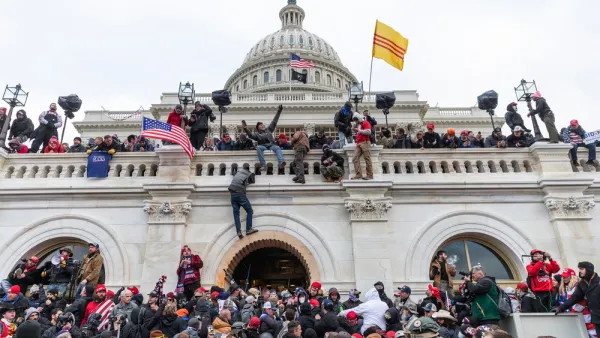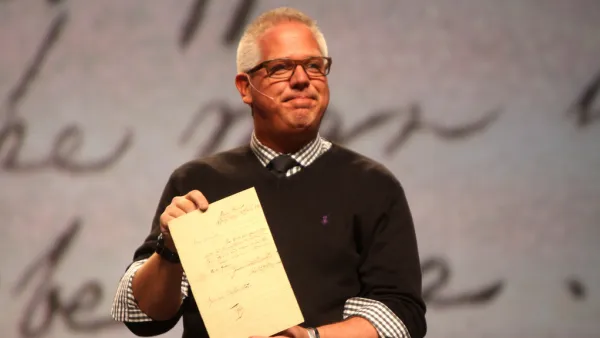The decay of America's infrastructure and the Bush Administration's repeated excuse, "Nobody could have foreseen..." reveals how much of America's planning tradition has been lost to free market ideology, writes Sarah Robinson.
America's legendary facility with foresight and planning has all but vanished under 30 years of conservative rule....Most Americans are so deeply marinated in this culture of planning that we don't realize just how unique it makes us. We take it as a given that almost every county and region, and every state and government agency involved in land use and infrastructure, has a regional master plan on file somewhere. Planning commissions large and small are already working 20 years out, penciling in where the major roads will go, where the water will come from, where the houses and shopping centers will be, how many schools and firehouses and sewer plants they're going to need, and how they're going to finance it all. We have emergency plans for evacuations, disasters, epidemics, floods. When's your road up to be re-paved again? Odds are that City Hall can tell you, up to 10 years out.
Most of these institutions have been doing planning at this range since shortly after World War II, which was when the American culture of planning came into full bloom...An entire generation learned to take the long view, think in big pictures, and visualize future events. When the war ended, millions of men and women brought those skills home to the cities and suburbs, and applied them every aspect of their lives from building companies to running households. These skills and habits became an embedded part of American culture.
Foresight is power. Organization and planning create the future. Those who have mastered these skills greatly increase the odds that they'll be the ones to choose the future for everyone else. And therein lies the problem.
Short-circuiting government's capacity to exercise any kind of planning or foresight (or, importantly, oversight) on behalf of the people was a core piece of [the Conservative] rise to power. The War on Science that Chris Mooney so amply documents was accompanied, in a much lower key, by a War on Planning that gutted all the various methods the government used to develop large-scale plans, track leading indicators, and detect and adjust for disruptions.
And so it was that the thousands of public employees around the country who kept track of trends in labor, public health, ecosystems, water, soil, weather, and so on just sort of went away - defunded or discouraged at the behest of business patrons whose interests were threatened by the things these observers recorded. The engineers tasked with maintaining our existing infrastructure and planning future improvements were pushed to retire, or found jobs in the private sector. The land use commissions in charge of enforcing long-term regional plans were just another obstacle to building strip malls and big box stores, and either bought off or sued into compliance.
In short, everybody who knew how to do anything - and especially those doing it in the service of the citizens of the United States, rather than for the benefit of one or another corporate profiteer - was gradually cut out of the process.
We look, astonished, at our shattered infrastructure and know that something has gone horribly wrong.
FULL STORY: Stealing Our Future: Conservatives, Foresight, and Why Nothing Works Anymore

Analysis: Cybertruck Fatality Rate Far Exceeds That of Ford Pinto
The Tesla Cybertruck was recalled seven times last year.

National Parks Layoffs Will Cause Communities to Lose Billions
Thousands of essential park workers were laid off this week, just before the busy spring break season.

Retro-silient?: America’s First “Eco-burb,” The Woodlands Turns 50
A master-planned community north of Houston offers lessons on green infrastructure and resilient design, but falls short of its founder’s lofty affordability and walkability goals.

Test News Post 1
This is a summary

Analysis: Cybertruck Fatality Rate Far Exceeds That of Ford Pinto
The Tesla Cybertruck was recalled seven times last year.

Test News Headline 46
Test for the image on the front page.
Urban Design for Planners 1: Software Tools
This six-course series explores essential urban design concepts using open source software and equips planners with the tools they need to participate fully in the urban design process.
Planning for Universal Design
Learn the tools for implementing Universal Design in planning regulations.
EMC Planning Group, Inc.
Planetizen
Planetizen
Mpact (formerly Rail~Volution)
Great Falls Development Authority, Inc.
HUDs Office of Policy Development and Research
NYU Wagner Graduate School of Public Service




























